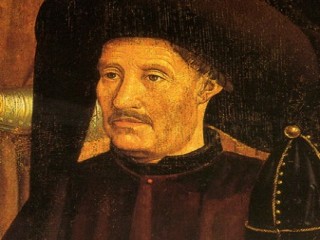
Henry The Navigator biography
Date of birth : 1394-03-04
Date of death : 1460-11-13
Birthplace : Porto, Portugal
Nationality : Portuguese
Category : Historian personalities
Last modified : 2011-06-10
Credited as : Prince, European exploration ,
Born at Porto on March 4, 1394, Henry was the third son of John I of Portugal and Philippa of Lancaster. He grew to maturity at a time when John I was bringing to a close a confused period of civil strife and war with Castile and securing Portugal's independence. The conflicts of this period had left the nobility decimated and impoverished and the monarchy's revenues greatly depreciated. Thus the ruling families began to look abroad for new worlds of wealth, land, and honors to conquer.
John and his sons became involved in a threefold movement of Portuguese expansion, comprising the campaign to conquer Moorish North Africa; the movement to explore and conquer the Atlantic island groups to the west and south; and the exploring, trading, and slaving expeditions down the West African coast. These ventures were united not by geographical curiosity but by Henry's overreaching desire to continue abroad the traditional Portuguese crusade against Moors and Berbers in the peninsula itself. He hoped also to catch Islam in a gigantic pincers movement by joining forces with the mythical "Indies" Christian kingdom of Prester John, the wealthy and powerful priest-king of medieval legend. The Prester's domains had been variously located in present-day India and in East Africa (Ethiopia).
King John wished to satisfy the avarice and lust for battle of his warriors; Prince Henry and his brothers wanted to prove their manhood and strike a blow for the faith on the battlefield. A campaign launched in July 1415 during a civil war in North Africa left the port of Ceuta stripped of its navy. Henry was knighted and made Duke of Viseu. With the fall of Ceuta the Portuguese learned of the long-established gold trade with black Africa conducted by caravan across the Sahara. Gold hunger had been growing in late medieval Europe in response to the growth of commerce, but Portugal had lacked gold coinage since 1383. Prince Henry may thus have sought to tap the supply at its source by venturing down the West African coast.
Henry's first sponsored voyages of exploration were to the Atlantic islands of Madeira and Porto Santo (1418-1419); colonization followed. These islands, as well as the Azores and Canaries, had been known to the earlier Middle Ages; they were now rediscovered and exploited by the Portuguese (the Azores ca. 1439), except the Canaries, which fell under the control of Castile. The Cape Verde Islands, much farther to the south, were discovered and settled in 1455-1460. Colonization of these islands was important for the entire subsequent history of Iberian expansion: they provided bases for voyages to the New World and for the development of practices used later in American colonization. More immediately, they brought in returns on capital loans extended by Prince Henry to island settlers.
Meanwhile, the Portuguese involvement in North Africa was proving to be a costly and dangerous undertaking. During Henry's disastrous attempt in 1437 to conquer Tangier, the Moslems roundly defeated the Portuguese and took Prince Henry's younger brother, Fernando, as a hostage against the return of Ceuta. Over the objections of Henry and his eldest brother, Duarte (then king), the royal council refused to make the trade, and Fernando lived out the rest of his days in a dungeon at Fez.
The repeated probes made down the West African coast at Henry's behest constitute the most significant achievement of his career. Only the most important of these expeditions will be mentioned here.
After many unsuccessful attempts Gil Eannes in 1434 rounded Cape Bojador on the North African coast. This point was the southernmost limit of previous European exploration, and Eannes's feat in sailing beyond it—and returning—constitutes the most important navigational achievement of the early Portuguese maritime enterprise. Further voyages under Nuno Tristão led to the rounding of Cape Blanco (1442), the occupation of Arguin Island (1443), and the discovery of the mouths of the Senegal (1444) and Gambia (1446) rivers. Cape Verde was attained by Dinas Dias in 1444, and the islands of that name were first visited by Alvise da Cadamosto in 1555. The mouths of the Geba and Casamance rivers were discovered by Diogo Gomes in 1456, and in 1460 Pedro da Sintra reached Sierra Leone. A total of about 1,500 miles of African coast had been explored by these expeditions.
The economic and political consequences of African "discovery" were momentous. The Portuguese obtained an ever-increasing flow of gold through trade with inhabitants of the coastal regions and in 1457 resumed minting gold coins. With a coarse African red pepper (malagueta) the Portuguese made their first incursion into the Italian monopoly of the spice trade. However, the most important long-range economic development was the beginnings of the African slave trade, which became significant after 1442. The Portuguese obtained slaves through raids on coastal villages and trade with the inhabitants of Gambia and Upper Guinea. In this way the Portuguese, at the very beginning of Europe's overseas expansion, provided the "woeful solution" for the problem of colonial labor power.
Equally important for future patterns of colonization were developments in economic, religious, and political policy. At this time the papacy commenced to issue its long series of bulls defining the rights of the colonizing powers. The Portuguese crown was awarded an exclusive monopoly over both present and future exploration, commerce, and conquest all the way to South Africa and the "Indies," as well as a spiritual monopoly over these same regions.
Henry supported and defined the missions of his captains and patronized map makers and others who could make practical contributions to the progress of discovery. But he sponsored no "school" of pure science and mathematics, and his reputation as a patron of learning has been grossly inflated. Henry died at Vila do Infante near Sagres on Nov. 13, 1460.
















